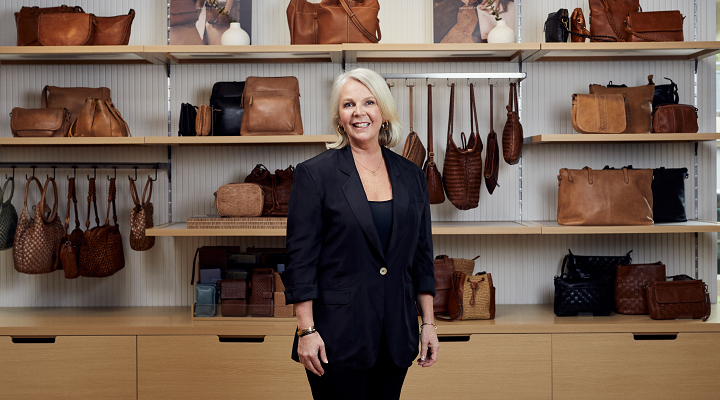The iconic Australian fashion and travel bag company has changed its name from Strandbags to Strand as part of a modernisation strategy that will affect every element of the business. It follows 20 per cent growth for the brand compared to pre Covid-19 levels, with an eagerness to fly, as well successful initiatives, generating foot traffic and sales. The launch of its new labels, Evity and Nere, delivered over $100 million in revenue. The brand is using this growth to make strategic
strategic investments, including upgrades to its existing stores, and the launch of a new, flagship location in Highpoint Shopping Centre on 10 December.
Strand chief executive Felicity McGahan tells Inside Retail that the brand is one of the best kept secrets in the retail industry.
To stay modern and relevant, however, it needed to evolve and attract younger audiences that will grow with the brand.
“Strand was a very successful business, and a category dominator, but it relied heavily on price. We needed to move forward to become a fashion and lifestyle business, [and] shift perception through this new brand positioning,” McGahan said.
Strand worked with the Frost Collective over the last four years to establish the new brand strategy, which would deliver across every element of the business.
McGahan said the process was led by extensive customer insights from its customer database of over two million people.
“It was our customers telling us that we were too cluttered, that there was too much going on. There was more feedback on why they didn’t shop with us versus why we did,” McGahan said.
“We haven’t rushed this process. It’s taken four years, and we’ve been taking our customers on this journey. [We’ve] added in more fashion, but not at the cost of functionality.”
She adds that customers want short, sharp and engaging content, as well as good in-store service and product knowledge.
“This is the busiest time of year, and the rebrand is our biggest idea,” she said.
[It’s] the perfect time to talk about it.”
Investing in people, partners and brands
According to McGahan, Strand has modernised its processes, and invested heavily in its product range, branding, digital experience, customer experience and its people.
Regarding its product range, the brand has prioritised adding fashionable products across its travel and handbag range. It is reducing its product options by 28 per cent, but increasing its focus on must-haves and big ideas.
In addition to the launch of its Evity and Nere brands, Strand acquired international travel brand Antler, and deepened its relationship with key partners including Samsonite, American Tourister and Guess. This, McGahan says, will enable Strand to provide more exclusive and differentiated product ranges.
The company is also evolving its physical and digital presence. It recently launched a new website, and its new Highpoint location will feature new service levels and points of sale features – as well as trained handbag stylists and expert luggage advisors – that will make for a more seamless customer experience.
McGahan says the brand has invested in its people, particularly across its tech, digital, marketing, design and sourcing departments.
“Growth, development and career path is what teams want. Staff don’t want to jump ship anymore, they want to stay and keep growing within the business they love,” she said.
She’s excited by the brand’s growth – with overall sales up by over 17 per cent compared to pre Covid-19 levels – and has hired about 480 staff from August, ahead of peak period.
“This isn’t just about travel coming back, but a strategy coming to life. [Amid] Covid-19, we saw that fashion and handbag sales picked up, but travel was knocked around,” she said.
Now, travel products are up 30 per cent. The exciting part is both lines are up and working.’
Investing in people, partners and brands
According to McGahan, Strand is planning to cut back the number of stores – from 268 to about 250 – but it is aggressively expanding the size of its shops, and building environments that showcase what’s new and fresh.
“For instance, the shops will take the [suit]case on a journey with the customer, and involve interactions with staff who will show them how to pack the perfect case,” she said.
“The square metre increase in-store is because the world is changing. These stores were built when wallets were important, today it’s luggage. It triggers a big change in our footprint.”
Strand has set up a team in London, and is looking to expand the business in the United States.
Although the business is looking beyond the Tasman, it sees opportunities within Australia across its portfolio.
“We have a few advantages if we go through tough, economic times. Firstly, accessories tend to do well, like lipstick in the war. People are also realising the joy of travel with family and friends, be it a trip to the coast or overseas. I don’t think that gets compromised again,” she said.
“As a customer said to me the other day, ‘I don’t know where I’m going, but I’m going somewhere.”
She adds that the name change was based on the brand’s emphasis on fashion and lifestyle, rather than just bags.
“I think it’s obvious that we’ve still got bags [and the name change] allows us to put a lot more underneath it,” she said.
“It feels fresh, modern and relevant.”

